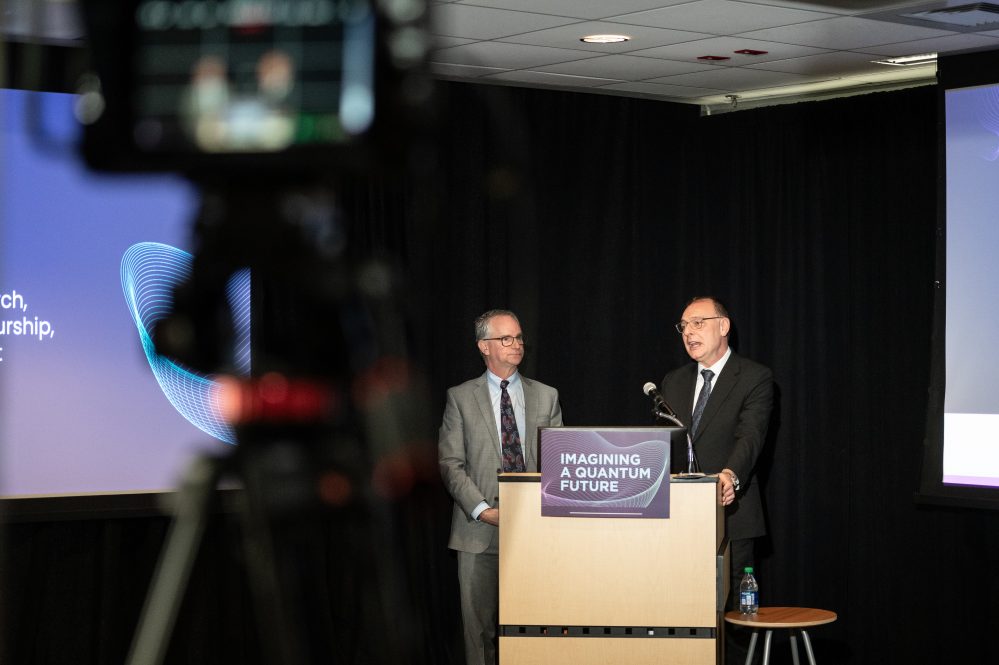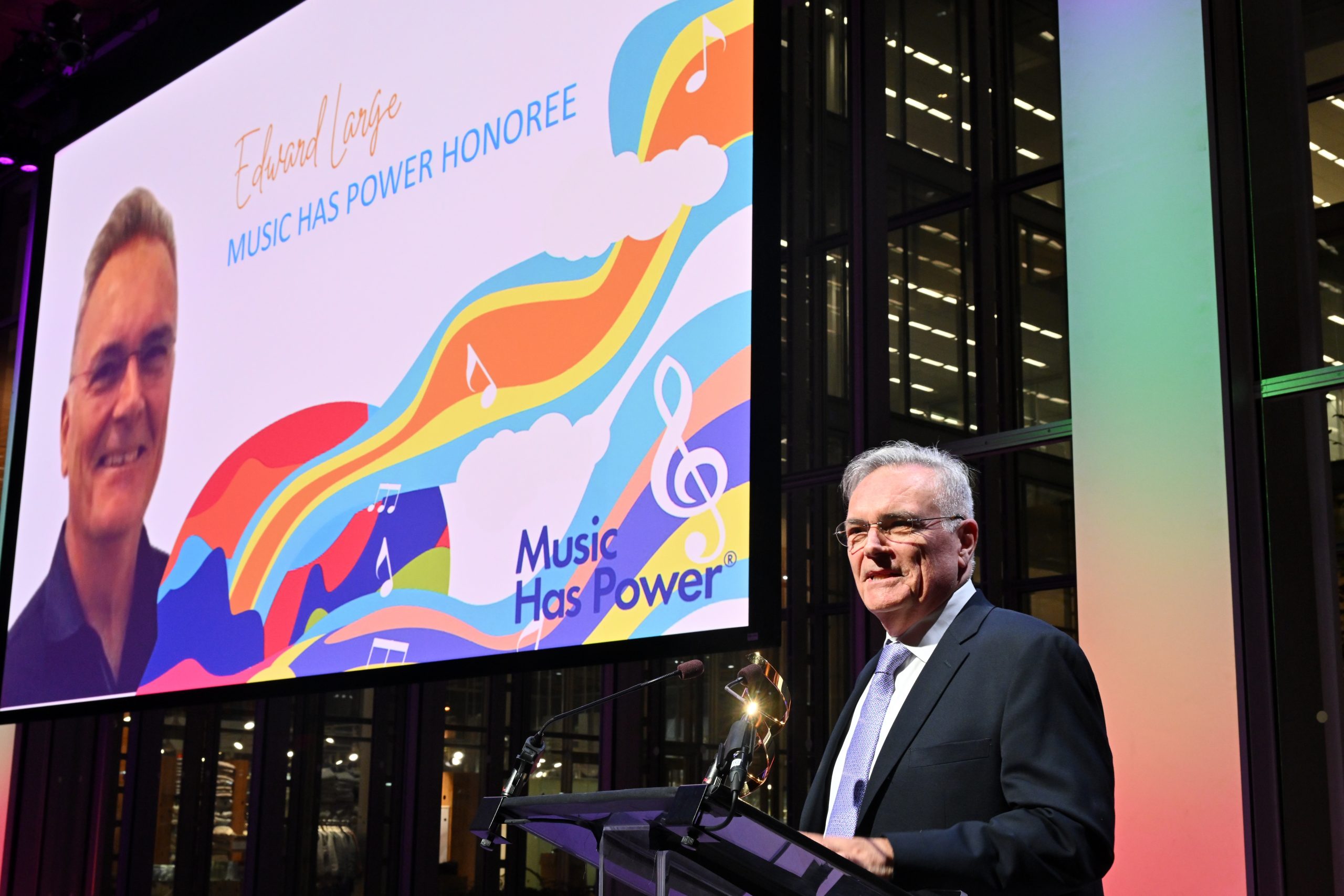If Connecticut is afforded the opportunity to develop the most advanced technology in the world—technology that would save lives, create jobs, strengthen the economy, and revolutionize many industries— how could it not vigorously pursue it?
That was the question that Rajeeb Hazra, an international quantum-computing expert, and the keynote speaker at Thursday’s “Imagining a Quantum Future’’ event, posed to the audience of more than 150 academic, government, and industry leaders.
“What gets me fired up is a future where the entire world benefits from novel developments,’’ Hazra says. “We could see cures for chronic diseases. Cancer and autism, and many other diseases, could be a thing of the past.
“We could create batteries that last a lifetime, so that you’d never have to stop to charge an electric vehicle,’’ he continued. “Quantum technology could solve problems that humanity, despite its best efforts, has not been able to solve.’’

Participants at the event learned how quantum technologies will be particularly valuable to Connecticut industries, including aerospace and advanced manufacturing, healthcare, and insurance and financial services. Leaders from each of those industries were present and helped lead breakout session discussions.
“I think Connecticut, if you look at the recipe, has all of the ingredients in the right proportion to succeed,’’ says Hazra, who is the president and CEO of Quantinuum, an international firm. “Collectively I see people changing their question from ‘Why Connecticut?’ to ‘Why not Connecticut?’’’
Hazra also emphasized the urgency to move forward quickly.
“We have to be smart because the quantum future is closer than we think,’’ he says. “There is not an infinite window to make these decisions.’’
Connecticut Innovation Officer: ‘This is Our Moment!’
The effort to make Connecticut a national quantum technology hub is spearheaded by Quantum CT, a collaboration of academic, business, and government entities.
UConn’s President Radenka Maric, Vice President for Research, Innovation & Entrepreneurship Pamir Alpay, and Yale University’s Vice Provost for Research Michael Crair, have all taken visible leadership positions on the initiative.
“This effort was initiated by Dr. Maric some 20 months ago, because she recognized the vast potential of quantum technologies,’’ Alpay said. Since then, the two universities have been working hand-in-hand to advance Connecticut’s position as a center of excellence in quantum.
In May, the National Science Foundation awarded Quantum CT with a $1 million planning grant to build a network of partners in science, education, industry, government, and within the broader community, as a whole. At the end of 2024, the team plans to submit a phase-two proposal for a $160 million award to make Connecticut the hub for nation’s quantum technology.
“This is our moment!,’’ says Dan O’Keefe, the commissioner designate of the Department of Economic and Community Development and Connecticut’s chief innovation officer. Connecticut has the brainpower and the expertise to advance complicated projects, including those involving quantum technologies. The state has recovered from the pandemic, and is poised for something big. “Now we need everyone rowing in the same direction,’’ he says.
Technology Could Revolutionize Almost Every Industry
‘Imagining a Quantum Future’ was the first event of its kind put on in support of Quantum CT. It was organized jointly by Launc[H], the driving force behind Hartford’s innovation ecosystem, the City of Hartford, the event’s lead sponsor, and UConn and Yale. Hosting it at the School of Business facility in Hartford was also strategic.
“Quantum technologies could revolutionize business in virtually every industry,’’ says David Souder, senior associate dean at the School of Business. “We are committed to developing talent that is prepared to address these complex challenges.’’
Dr. Jeffrey Hines, UConn Health’s Chief Diversity Officer, says quantum technology has the ability to benefit many previously marginalized communities, through workforce development, education, manufacturing and more. He believes that efforts being made to develop comprehensive workforce development and education strategies, through Quantum CT, offer tremendous opportunities to advance equity and inclusion in our state.
Hartford Mayor Luke Bronin, who is completing his eighth and final year in office, says that quantum technology has enormous potential to transform the world and Connecticut’s industries. He says he is excited about the synergy between Yale and UConn.
“It’s a powerful partnership that marshals all the strengths of academics and industry to accelerate this work and position Connecticut at the forefront,’’ he says.
Hartford Mayor-Elect Arunan Arulampalam also expressed his enthusiasm and support for advancing Hartford’s position as a center of innovation. “We’re reclaiming the soul of this city!,’’ he said, citing the fact that the first electric vehicle was developed and built in Hartford a century before the emergence of Tesla.
Crair, from Yale, says that the collegiate partnership has been mutually beneficial and will help the institutions recruit and retain the best educators, who seek environment of innovation and robust discovery.
Alpay, his UConn counterpart, says he is excited about the economic development opportunities that Quantum CT can generate, as well as its focus on developing new strategies to educate the next-generation workforce.
“This is the technology of the future and we recognize the importance and opportunities of leading from the inception,’’ he says.
Maric says she is pleased with the progress that the team has made so far, and remains excited for what is to come.
“UConn is honored to join Yale as leaders in the effort to make Connecticut America’s accelerator by transforming a diverse, compact region into an economic development powerhouse using quantum tech,” Maric says. “Our event, ‘Imagining a Quantum Future’ in Hartford generated tremendous excitement and helped to strengthen the partnerships that we will need to succeed.’’



